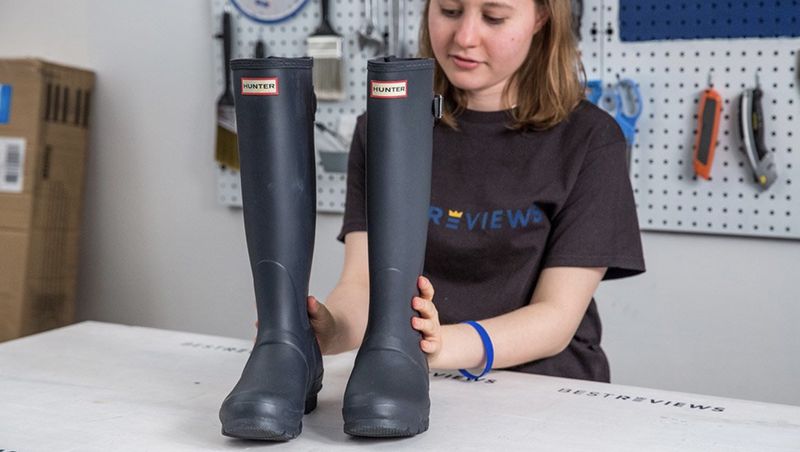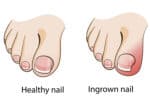Rubber boots are your best friend during severe, unpredictable weather. Not only do they provide good traction against slippery, wet surfaces, but they also keep your feet dry and safe during heavy rains.
However, rubber boots come with its own drawbacks, so we should be careful and take necessary precautions to avoid any unnecessary discomfort.
YES, rubber boots do make your feet sweat. Since we know that rubber is an impermeable material, it absorbs and traps moisture and heat, preventing it from passing through, resulting in an unpleasant odor and exposing your feet to bacterial and fungal infections, which can cause blistering, cracking, irritation, and pain.

So what makes your feet sweat in rubber boots?
To answer this question, let us understand how rubber is manufactured.
Because different types of rubber are used to make different rubber items, your rubber boots are usually made of something called isoprene, commonly known as natural rubber. This material has a high tensile strength, as well as a strong tear resistance.
However, once your feet sweats in the boots made of this material, it doesn’t dry and the moisture remains, causing itching and bad odor since the material is non-breathable.
Also, rubber boots are usually worn during rain to protect your feet from getting wet, and that is why they are almost knee high which in no way allows air to pass through and reach your feet.
Before we get into details, let us understand something good and bad about rubber boots.
Advantages of Rubber Boots
1.) It prevents slips and falls as rubber soles are slip-resistant making them ideal for extreme wet and risky surfaces.
2.) Keeps your feet dry during heavy rain.
3.) Rubber is a strong material, so rubber boots will act as a barrier against anything that has a chance of falling on your feet.
Check out the Dunlop Protective Rubber Boots that comes with a steel toe for extra protection of your feet-
- 100% Waterproof
- Made in USA
- Lightweight modern design 25% lighter than classic PVC boots
- Energy absorbing BAY-LOC outsole with channels to repel water
- Dunlop Pull Tab for easy on off
Prices pulled from the Amazon Product Advertising API on:
Product prices and availability are accurate as of the date/time indicated and are subject to change. Any price and availability information displayed on [relevant Amazon Site(s), as applicable] at the time of purchase will apply to the purchase of this product.
4.) Another benefit of rubber boots is that they are extremely cold-tolerant. Rubber boots help keep your feet cozy in the cold. It will help you to easily walk up in steep terrains or to other locations where the surface is uncertain.
You can check out this boot by YOANGRY, that comes with a durable insulated rubber and a soft insole that keeps you comfortable-
- Made from neoprene and rubber.
- 100% Waterproof
- High Traction
- Lightweight material and non-slip outsole which can make sure your foot more comfortable.
Prices pulled from the Amazon Product Advertising API on:
Product prices and availability are accurate as of the date/time indicated and are subject to change. Any price and availability information displayed on [relevant Amazon Site(s), as applicable] at the time of purchase will apply to the purchase of this product.
5.) Rubber boots last a long time. With good care, you can use it for many more years. They’re quite durable, and therefore ideal for a work environment.
Now, here are some of the disadvantages of rubber boots:
1.) They’re not as flexible since rubber material tends to retain its original form. They also take time to break in.
2.) They cause blisters as your skin’s friction against rubber will irritate your skin and lead to painful blisters.
3.) Most rubber boots do not come with arch heels and hence there is no arch support. This is not ideal for people with flatfeet.
4.) Rubber boots are comparatively heavy
5.) With rubber boots, your feet are prone to bacterial and fungal infections because of its non-breathable nature because your sweat or any moisture will not be absorbed.
So what can you do to prevent sweat and moisture retaining in your rubber boots?
Don’t worry, we have compiled a list of tips for you to prevent your feet from sweating in rubber boots.
1.) Go for the right fit
Shoes that are too tight aren’t only uncomfortable; they also enhance your chances of having wet, sticky feet inside.
If your toes are squeezed inside your boots, air movement will be restricted, causing the temperature to rise, especially between your toes. Make sure your feet have adequate breathing room to avoid turning your shoes into a steamer.
2.) Use Bama socks
These socks are a perfect combination with rubber boots as it allows you to wick away moisture when worn in your boots.
It will certainly aid in sweat absorption and keep your feet comfortable and dry. Simply put a thinner pair of socks under the Bama bootie during the summer months.
It also acts as a form of insulation against the cold.
Check them out here-
- Provide Moisture and Cold Protection
- The bama sokket make your shoes warmer and far comfier.
- The smooth middle layer provides cushioning adding to the comf
Prices pulled from the Amazon Product Advertising API on:
Product prices and availability are accurate as of the date/time indicated and are subject to change. Any price and availability information displayed on [relevant Amazon Site(s), as applicable] at the time of purchase will apply to the purchase of this product.
3.) Use moisture wicking socks
Cotton is one of the most popular materials for socks, but it’s also one of the worst for keeping your feet dry because it can’t absorb moisture without becoming soggy.
Because your rubber boots don’t allow your feet to breathe, these moisture wicking socks aid in the absorption of sweat and the prevention of odor.
Check it out here-
- Run Dry Moisture Management Provides Superior Moisture Transport with our Ultra Wicking Fibers. So, Whether youre in the Gym or on the Road, your Feet Stay Fresh.
- Airmesh Venting. Mesh Ventilation Construction Creates Maximum Airflow to Keep Your Feet Cool and Dry in any Running Conditions.
- Targeted Arch Compression Engineered with Just the Right Amount of Compression to Keep your Arch Stabile and Secure. Our Arch Support System also Prevents Bunching and Helps Keep Your Sock From Slipping.
- Cushioned Sole. Light Cushioning Provides Impact Protection without taking up too much Space inside your Sho
Prices pulled from the Amazon Product Advertising API on:
Product prices and availability are accurate as of the date/time indicated and are subject to change. Any price and availability information displayed on [relevant Amazon Site(s), as applicable] at the time of purchase will apply to the purchase of this product.
4.) Go for some knitted wool socks
I know it sounds strange, but wool socks are your best pals for cool and dry feet in the summer heat, wicking away moisture to keep your feet from becoming soggy with all that sweat accumulating.
5.) You can use footpowders or anti-perspirant spray
Do not confuse deodorant with antiperspirant because a deodorant will mask your odor but will do nothing to keep you from sweating.
Antiperspirant, on the other hand, is made up of aluminium chloride hexahydrate, which has all of the necessary qualities required to prevent excessive sweating.
Make sure your feet are fully dry before spraying them. Be careful since some of these sprays tend to leave stains on your socks and shoes.
Mixing powders and antiperspirants, on the other hand, can have the exact opposite consequence of what you’re aiming for. For some people, powders work better, while antiperspirant spray works better for others. Try both and see which one works best for you.
Some preventive measures you can take:
1.) Carry extra socks with you. If there are chances that your feet will sweat, then always carry extra socks with you so that you can change into a fresh pair as soon as one is wet and soggy. This way, you can prevent moisture from accumulating in your feet inside rubber boots.
2.) The simplest option is to remove your rubber boots whenever possible. Allow your feet to dry naturally during your breaks.
Even the most breathable work boots can’t compare to being able to go about with your feet free. Excess sweating can be reduced by going barefoot for at least 5 minutes a couple of times throughout the day.
Conclusion
Well, rubber does make your feet sweat but it doesn’t take away the benefit it provides. You can always take some necessary precautions to avoid sweat and keep your feet comfortable in rubber boots.
In this article, we have provided you with tricks to overcome the issue of sweating and how to prevent infections if you sweat.
Hope this was helpful!












